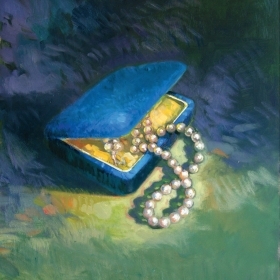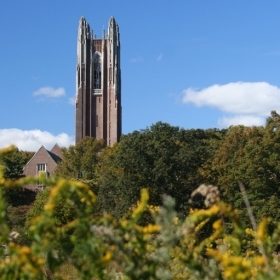Am I about to encounter another racist alumna from a throwback era? This went through my mind in 1994 when I hopped on the Paris Métro to meet Nadia Marculescu Lacoste ’44. I was ready for life’s adventures in the Wellesley-in-Aix program—good or bad.
The first 1940s-era alumna I met eagerly recounted a “fabulous” White House dinner she once attended. What made it so great? The “really dark servants serving the meal.” It felt like she was romanticizing being Scarlett O’Hara fanned by slaves on a hot summer day. Wanting to crush her antebellum dream, I responded, “You must not realize I’m Black.” My light skin often provides a false sense of racial license and comfort as if whites are “amongst their own.” She reacted by saying, “Excuse me,” and abruptly walking away.
Navigating to Paris’ 16th arrondissement, I hoped Nadia wasn’t cut from white-supremacist cloth. Hopes were high, but expectations low. I didn’t know I was embarking on one of the most beautiful and fulfilling relationships of my life—the first of countless journeys as our friendship grew from my calling her “Madame Lacoste” to “Nana.”
That summer, the Wellesley Club of France had launched a new grant. Wellesley-in-Aix students could seek funding for interesting experiences. My proposal to study photography was selected, and I used the money to join an Aix-en-Provence photography club, which instilled in me a lifelong passion.
Upon receiving the notification letter, I wrote a thank-you note. Nadia wrote back saying to call her once I arrived in Paris to schedule lunch. Surprisingly, she revealed I was the only recipient who wrote her a thank-you note!
Nadia was nothing like the racist alumna I met. She was progressive yet refined, open-minded, humble, charming, a wonderful storyteller, and avant-garde. A trailblazer and ride-or-die Wellesley fan, she loved to joke and laugh, thriving on human connection. Nadia was generous with her time, wisdom, and love. Her personal journey affected how she saw the world.
Born in Bucharest in 1922, she immigrated to New York City in 1941 from Nazi-occupied Romania, became an American, and made her way to Wellesley. After graduation, Nadia moved to Hollywood and worked for MGM Studios. Later, she moved to Paris, again working for MGM, started her own publicity business, fell in love, married Robert Lacoste, and had their son, Thierry. Masterfully, and with a subtle hint of scrappy grit and audacious gumption beneath her sophisticated grace, she juggled work, entrepreneurship, motherhood, marriage, and elder care between Paris and Monaco—creating the press office for the Principality of Monaco and overseeing public relations for the principality and the royal family for nearly 50 years. In 2008, Nadia was awarded the French Legion of Honor with Prince Albert attending. Needing to be invited only once, I sprinted to the airport to attend the ceremony.
Over the years, Nadia shared stories of hitchhiking rides from Ronald Reagan to MGM’s Los Angeles studio lot during the war—only to pretend decades later not to know President Reagan because Nancy was a “jealous woman.” She described how conversations with Princess Grace of Monaco prompted Nadia to teach Thierry about the “birds and bees.” When a waiter spilled red wine on my pants, she shared a trick learned from Bette Davis. She disclosed personal stories about difficulties in her life, great loves, heartbreak, and life lessons, and she never hesitated to listen with compassion.
In 2000, while I studied law abroad in Paris, we spent more time together. She took me to Democrats Abroad meetings, and we watched the “hanging-chad” presidential election results together. Once, I surprised her at an event in Paris when she was president of the Wellesley Club of France—flying in from New York. The astonishment on her face was priceless.
Over 15 years ago, she said, “Fatimah, I want you to do something for me.” “What, Nana?” “I want you to visit me once a year until I die.” Although COVID-19 upended this plan, I kept this promise. Nana peacefully passed away in Paris on Feb. 12 at age 98.
Over the years, I brought a parade of siblings and friends through Paris, including my mother. Nadia welcomed each with open arms. One friend told me that Nadia said she was always amazed by how accepting I was of her—not judging her but embracing her as is. This blew me away. When we met, I was the scholarship kid with an unglitzy life.
But I did accept her and her unconventional journey and courageous life choices, and she accepted me, no matter how unapologetically candid or F-bomb-dropping I was.
Nadia could cut through the surface to genuinely see you. She taught me the importance of prioritizing what really matters. And she never had a closer, more honest friendship with a Black American woman. Our magical bond transcended age, race, and time.
When talking about work, she’d frequently interrupt with sassiness in her voice. “Enough about work, tell me about your love life!” Well, Nana, you are one of the greatest loves of my life. I could have never imagined so much joy and love would flow from picking up a pen, reaching for stationery, and writing a thank-you note.
Nana, rest in peace and mutual racial acceptance. Pop some Champagne up there for a life well lived!
Fatimah Gilliam ’96 is the founder of The Azara Group, a strategy consulting firm specializing in diversity and inclusion, leadership development, and negotiation services, and the author of the forthcoming book Race Rules.







